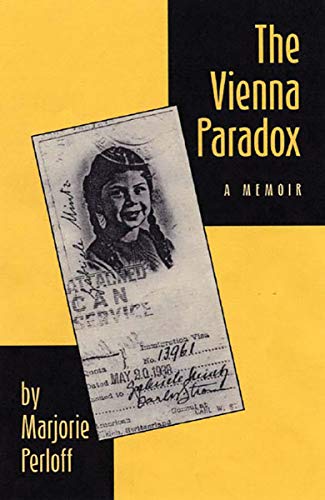
Synopsis
A fascinating memoir of refugee flight and survival, intellectual yet highly personal, by one America's eminent literary critics.
The Vienna Paradox is Marjorie Perloff's memoir of growing up in pre-World War II Vienna, her escape to America in 1938 with her upper-middle-class, highly cultured, and largely assimilated Jewish family, and her self-transformation from the German-speaking Gabriele Mintz to the English-speaking Marjorie―who also happened to be the granddaughter of Richard Schüller, the Austrian foreign minister under Chancellor Dollfuss and a special delegate to the League of Nations. Compelling as the story is, this is hardly a conventional memoir. Rather, it interweaves biographical anecdote and family history with speculations on the historical development of early 20th-century Vienna as it was experienced by her parents' generation, and how the loss of their "high" culture affected the lives of these cultivated refugees in a democratic United States that was, and remains, deeply suspicious of perceived "elitism." This is, in other words, an intellectual memoir, both elegant and heartfelt, by one of America's leading critics, a narrative in which literary and philosophical reference is as central as the personal."synopsis" may belong to another edition of this title.
About the Author
Marjorie Perloff is the Sadie Dernham Patek Professor of the Humanities Emerita at Stanford University and the author and editor of over a dozen books on literary and art criticism as well as cultural history.
Reviews
Since emigrating from Vienna with her family in 1938 at the age of six-and-a-half, the former Gabriele Mintz has made a reputation for herself under the penname Marjorie Perloff. Her books (The Dance of the Intellect; The Futurist Moment, etc.) have established her as one of the major American critics of 20th century modernist and late-modernist writing. In this memoir, she traces her intellectual and social development, showing how they were shaped by her experience as a refugee from a hostile territory that she would not see again until 1955, after she was married but still before she launched her career. Though Perloff works in resonances from Vienna’s modernist artists throughout her book, most of it remains a straightforward telling of who her family was and is, and of how she navigated her way from the New York City schools to Oberlin College. Not a conventional coming-of-age memoir that processes things emotionally, Perloff’s story of her youth hones in on the institutions, people and places that formed her logos, by chance and by choice. In that, it is entirely successful.
Copyright © Reed Business Information, a division of Reed Elsevier Inc. All rights reserved.
"About this title" may belong to another edition of this title.
Search results for The Vienna Paradox: A Memoir
The Vienna Paradox
Seller: ThriftBooks-Atlanta, AUSTELL, GA, U.S.A.
Paperback. Condition: Good. No Jacket. Pages can have notes/highlighting. Spine may show signs of wear. ~ ThriftBooks: Read More, Spend Less. Seller Inventory # G0811215717I3N00
The Vienna Paradox
Seller: ThriftBooks-Dallas, Dallas, TX, U.S.A.
Paperback. Condition: Very Good. No Jacket. May have limited writing in cover pages. Pages are unmarked. ~ ThriftBooks: Read More, Spend Less. Seller Inventory # G0811215717I4N00
THE VIENNA PARADOX A Memoir
Seller: AVON HILL BOOKS, Cambridge, MA, U.S.A.
Softcover. Condition: Near Fine. Inscribed by author. ; 8vo 8" - 9" tall; 224 pp. Seller Inventory # 57464
VIENNA PARADOX PA
Seller: INDOO, Avenel, NJ, U.S.A.
Condition: New. Brand New. Seller Inventory # 9780811215718
The Vienna Paradox â" A Memoir
Seller: WorldofBooks, Goring-By-Sea, WS, United Kingdom
Paperback. Condition: Very Good. The book has been read, but is in excellent condition. Pages are intact and not marred by notes or highlighting. The spine remains undamaged. Seller Inventory # GOR010066009
Buy Used
Quantity: 1 available
The Vienna Paradox: A Memoir (New Directions Paperbook)
Seller: AwesomeBooks, Wallingford, United Kingdom
Paperback. Condition: Very Good. The Vienna Paradox: A Memoir (New Directions Paperbook) This book is in very good condition and will be shipped within 24 hours of ordering. The cover may have some limited signs of wear but the pages are clean, intact and the spine remains undamaged. This book has clearly been well maintained and looked after thus far. Money back guarantee if you are not satisfied. See all our books here, order more than 1 book and get discounted shipping. Seller Inventory # 7719-9780811215718
Buy Used
Quantity: 1 available
The Vienna Paradox: A Memoir
Seller: Southampton Books, Sag Harbor, NY, U.S.A.
Paperback. Condition: Like New. FIRST THUS. First Edition Thus, First Printing. Not price-clipped. Published by New Directions Books, 2004. Octavo. Paperback. Book is signed by the author on the title page. Book is like new . 100% positive feedback. 30 day money back guarantee. NEXT DAY SHIPPING! Excellent customer service. Please email with any questions. All books packed carefully and ship with free delivery confirmation/tracking. All books come with free bookmarks. Ships from Sag Harbor, New York. Seller Inventory # 318222
The Vienna Paradox: A Memoir (New Directions Paperbook)
Seller: Bahamut Media, Reading, United Kingdom
Paperback. Condition: Very Good. This book is in very good condition and will be shipped within 24 hours of ordering. The cover may have some limited signs of wear but the pages are clean, intact and the spine remains undamaged. This book has clearly been well maintained and looked after thus far. Money back guarantee if you are not satisfied. See all our books here, order more than 1 book and get discounted shipping. Seller Inventory # 6545-9780811215718
Buy Used
Quantity: 1 available
The Vienna Paradox: A Memoir
Seller: Goulds Book Arcade, Sydney, Newtown, Sydney, NSW, Australia
Paperback. Condition: Very Good. 283 pages. The cover has a little wear. The page edges are lightly foxed. Books listed here are not stored at the shop. Please contact us if you want to pick up a book from Newtown. Seller Inventory # 176581
The Vienna Paradox
Seller: Russell Books, Victoria, BC, Canada
paperback. Condition: New. Special order item direct from the distributor. Seller Inventory # R9780811215718
